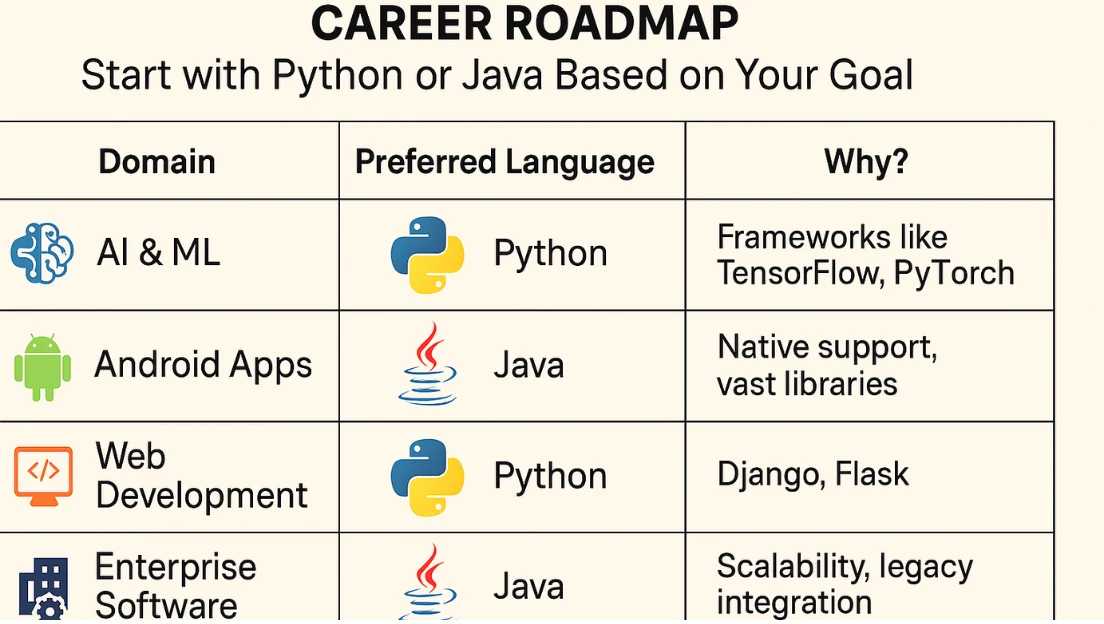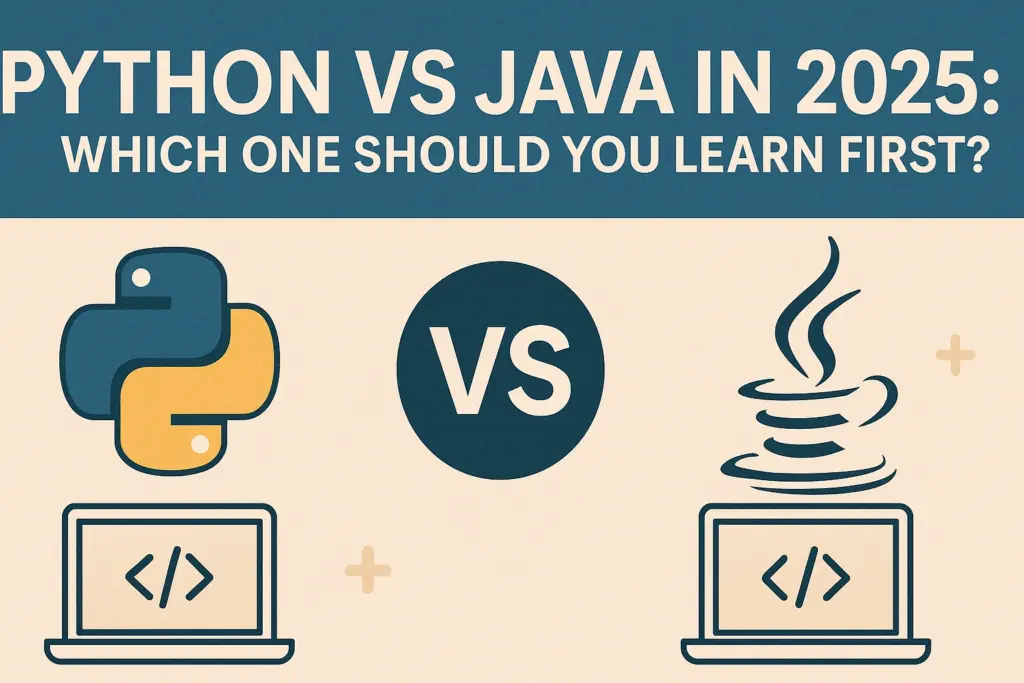Introduction
Choosing your first programming language is a critical decision, especially in 2025’s rapidly evolving tech ecosystem. Among the top contenders, Python vs Java have stood the test of time. But with changing job markets, the rise of AI, and new software development trends, which language should you learn first in 2025?
This guide breaks down the debate between Python vs Java in 2025 to help aspiring developers, computer science students, and career changers make an informed decision based on current data, global market trends, and career goals.
Why This Debate Still Matters in 2025
Python and Java both remain highly relevant, but they serve different needs:
- Python: Known for simplicity and booming in data science and AI.
- Java: Enterprise-grade, known for robustness, security, and cross-platform compatibility.
Their enduring popularity makes the comparison timely and essential.
Comparative Chart: Python vs Java in 2025
Python vs Java Comparison
| Feature | Python | Java |
|---|---|---|
| Ease of Learning | Very Easy (Beginner-friendly) | Moderate (More structured) |
| Job Opportunities | AI, Data Science, Web Dev, Automation | Enterprise Apps, Android, Backend |
| Average Salary (2025) | $106,000 (US) | $104,000 (US) |
| Performance | Slower, but fast prototyping | Faster, better performance |
| Use in AI/ML | Dominant | Limited |
| Community Support | Massive and growing | Mature and stable |
| Best For | Rapid development, AI, scripting | Large-scale systems, Android |
Learning Curve: Python Wins for Beginners
Python’s syntax reads like English, making it a favorite among coding bootcamps and beginners. It allows you to build real-world applications quickly without worrying too much about boilerplate code.
Java, while more verbose, enforces strong typing and object-oriented principles early on, which can be valuable for long-term software engineering habits.
Conclusion: If you’re starting from scratch, Python is more forgiving and allows faster wins.
Industry Demand in 2025
Python
Python has become the default choice for:
- AI & Machine Learning
- Data Science and Analytics
- Automated Testing and DevOps Scripts
Java
Java remains critical in:
- Banking and FinTech
- Android App Development
- Large-scale Enterprise Applications
GEO Comparison:
- California: Python dominates startups and AI roles.
- Berlin: Java still powers many enterprise applications; however, Python is gaining ground in ML startups.
- Bangalore: Python is leading for fresher roles in data science, while Java retains stronghold in MNC backend teams.
Job Market Trends and Salary Comparison
Python vs Java Job Market
In 2025:
- Python roles are seeing 22% YoY growth, especially in AI, cloud automation, and analytics.
- Java jobs are growing at 9%, mostly in stable industries like finance and telecom.
Salary Trends
- Python Developers (US): ~$106,000/year
- Java Developers (US): ~$104,000/year
- In India, Python developers at top firms average ₹11–13 LPA, while Java developers average ₹10–12 LPA.
Source: Glassdoor, Payscale, Naukri data, 2025
Conclusion: Python has a slight salary edge and faster-growing sectors.
Use Cases by Domain
| Domain | Preferred Language | Why? |
|---|---|---|
| AI & ML | Python | Frameworks like TensorFlow, PyTorch |
| Android Apps | Java | Native support, vast libraries |
| Web Development | Python | Django, Flask |
| Enterprise Software | Java | Scalability, legacy integration |
| Automation & Scripting | Python | Simpler syntax, wide OS support |
When to Choose Python
- You’re starting from zero and want to build quickly.
- You aim to work in AI, data science, or automation.
- You enjoy scripting, prototyping, or API development.
- You want an easier onboarding to programming logic.
When to Choose Java
- You’re focused on Android or enterprise back-end development.
- You want to build large-scale, performance-critical systems.
- You’re aiming for jobs in finance, e-commerce, or telecom sectors.
- You want strong object-oriented discipline early on.
Career Roadmap: When to Learn Python or Java

Frequently Asked Questions (FAQ)
Q1: Is Python better than Java in 2025?
A: Python is better for beginners, AI, and rapid development. Java is better for large-scale enterprise apps and Android development. It depends on your career goals.
Q2: Which programming language has better job prospects in 2025?
A: Python has better prospects in emerging domains like AI and data science, while Java has stable demand in traditional enterprise sectors.
Q3: Which is more difficult: Python or Java?
A: Java is more difficult for beginners due to its stricter syntax and verbosity. Python is easier and more intuitive.
Q4: Can I learn both Python and Java?
A: Yes, many developers do. Start with the one that aligns with your short-term goals and learn the other as you grow.
Q5: Is Python replacing Java?
A: Not entirely. Python is gaining in AI and startups, but Java is irreplaceable in legacy systems and large corporations.
Conclusion
Python vs Java in 2025 is not a zero-sum game. Both languages offer immense value—but your personal goals should dictate your first choice. If you’re eyeing a future in AI, automation, or rapid web development, start with Python. If your path lies in enterprise systems or Android apps, go with Java.
Explore the best path for your career—start learning Python or Java today based on your goals. Subscribe to our newsletter for personalized learning tracks and job insights.
